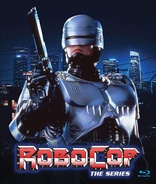RoboCop: The Series Blu-ray Movie
HomeRoboCop: The Series Blu-ray Movie 
Liberation Hall | 1994 | 1020 min | Rated TV-14 | May 24, 2022Movie rating
6 | / 10 |
Blu-ray rating
| Users | 3.0 | |
| Reviewer | 2.0 | |
| Overall | 2.0 |
Overview
RoboCop: The Series (1994)
Alex Murphy is Robocop, a cybernetic policeman. A creation of a vast corporation, he fights crime and occasional corporate conspiracy in the near-future of Old Detroit.
Starring: Richard Eden, Yvette Nipar, Blu Mankuma, Andrea Roth, David Gardner (I)Director: Paul Lynch, Michael Vejar, Allan Eastman, Mario Azzopardi, Timothy Bond
| Sci-Fi | Uncertain |
| Crime | Uncertain |
| Adventure | Uncertain |
| Action | Uncertain |
Specifications
Video
Video codec: MPEG-4 AVC
Video resolution: 1080p (upconverted)
Aspect ratio: 1.77:1
Original aspect ratio: 1.33:1
Audio
English: LPCM 2.0
Subtitles
None
Discs
Blu-ray Disc
Five-disc set (5 BDs)
Playback
Region free
Review
Rating summary
| Movie | 2.0 | |
| Video | 1.0 | |
| Audio | 3.0 | |
| Extras | 1.5 | |
| Overall | 2.0 |
RoboCop: The Series Blu-ray Movie Review
Reviewed by Dr. Stephen Larson August 4, 2022Paul Verhoeven's maiden American feature RoboCop (1987) was a surprise critical success and unexpected box-office smash, taking in more than $53 million domestic receipts. Orion Pictures looked to expand the RoboCop franchise by widening its demographic base so it teamed with Marvel on a twelve-episode cartoon series the following year. (The series is highly deserving of a Blu-ray release.) Orion also distributed RoboCop 2 (1990) and RoboCop 3 (1993) but neither was the critical or commercial success that the inaugural film was. When Orion was going bankrupt in the early '90s, John Labatt’s Skyvision Entertainment was at the forefront of a bidding war to secure the rights for a live-action TV series. “We went after Orion for about six months until they agreed to sell it to us” series executive producer (with Kevin Gillis and Steve Downing) Brian Ross was quoted by Kate O’Hare of Tribune Media Services as saying. The press notes for the series state that when original scribes Edward Neumeier and Michael Miner learned of the Orion-Skyvision deal, they wanted to get involved. Neumeier and Miner co-wrote a script to a RoboCop sequel which went in a different direction than what Orion wanted for RoboCop 2. The screenwriters took parts of this unproduced script and made it into a teleplay which became “The Future of Law Enforcement,” the series' two-hour pilot.
The Ottawa Citizen's Tony Atherton reported that with a budget of $32.5 million, RoboCop: The Series was the most expensive Canadian TV production up to that point. James Van Hise has chronicled in his 1994 book, The New SCI FI TV (Pioneer Books), that the series started filming in October 1993. The pilot was filmed in 24 days of main unit and 12 days of second unit. The pilot concluded shooting in November at a cost of $5 million. (Ten additional scripts were ready for production after shooting wrapped on the pilot.) The other 21 one-hour episodes were filmed on an eight-day schedule (an industry standard at the time) and cost between $1.25 million and 1.5 million per episode.
My research indicates that the series takes place in the year 2005. The action is set in Old Detroit which exists in the shadow of the ultra-modern Delta City. Robert John Burke, who donned the RoboSuit in RoboCop 3, told author Calum Waddell (RoboCop: The Definitive History) that he was approached by the series' producers to reprise the title role but turned them down because he felt they should go with a younger actor. Candadian thespian Richard Eden auditioned and won the coveted lead. Officer Anne Lewis (Nancy Allen) has been replaced with Det. Lisa Madigan (Yvette Nipar) as Robo's partner. Instead of being called "The Old Man," as the head of OmniConsumer Products (OCP) was referred as in the first two movies, he's now called "The Chairman." Rip Torn was apparently not asked to play OCP's CEO following the third installment. David Gardner portrays The Chairman. The affable Sgt. Stanley Parks (Blu Mankuma) fills the shoes of Sgt. Reed (Robert DoQui) from the three features. RoboCop 3's tech-savvy youngster Nikko (Remy Ryan) becomes Gadget (Sarah Campbell) in the series. Gadget is an orphan who's adopted by Sgt. Parks.
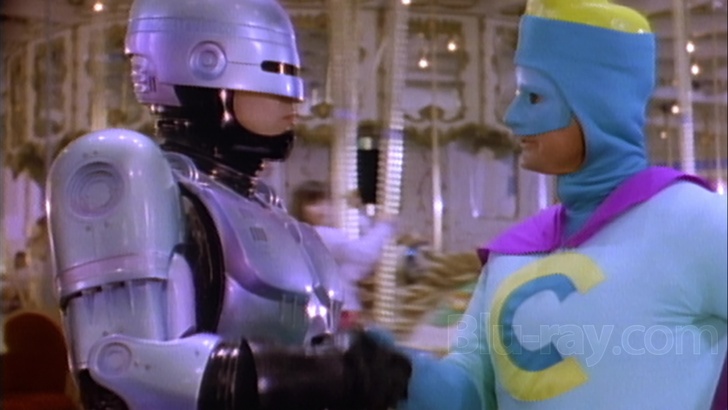
RoboCop, meet Commander Cash.
For the pilot, Neumeier and Miner intentionally ignore the story events in the RoboCop sequels. They introduce a new nemesis for Robo in the disfigured form of William Ray "Pudface" Morgan (James Kidnie), an escapee from the Henry Ford Center for the Morally Challenged. Pudface claims that he has a history with Robo. I have the same inference as Calum Waddell that he's either based or inspired by Emil Antonowsky (Paul McCrane), Clarence Boddicker's chief henchman. In RoboCop's climax, Emil came in contact with toxic waste and Pudface's grotesque face has a similar appearance (except that the latter has a much longer nose). The other villains are crooked OCP Vice President Chip Chayken (John Rubinstein) and Dr. Cray Z. Mollardo (Cliff De Young). They've concocted a "NeuroBrain” to power Metronet, a supercomputer they've developed to run the city. Standing in their way (besides RoboCop) is a shrewd blonde secretary named Diana Powers (Andrea Roth). After Diana meets an untimely fate, she becomes a ghost in the machine where she assumes transparent human form within an energy field.
The central problem with “The Future of Law Enforcement” and most of the other episodes is that the lampooning of OCP executives and scientists is so over-the-top that the portrayals become a laughable farce. This series employs satirical commentary but it's nowhere near as effective as the first two RoboCop installments. This is primarily because it lacks the "hard edge" that the films possess and because the writing isn't as sharp. The episodes do improve after the pilot, though. The teleplays have good to very good ideas but they're only half-baked across the narratives. "RoboCop vs Commander Cash," which features Roddy Piper in a pivotal role, had the potential to be one of the better episodes but there's a plot hole so massive that the kids driving a truck at the beginning could have plowed right through it.
RoboCop: The Series rather surprisingly received critical accolades from a majority of the American press. For example, Marion Garmel, then a TV critic for The Indianapolis News compared it favorably to the original feature: “[The series] retains the humor, the action and the thrills that made a hit of the first RoboCop movie in 1987.” Ed Bark of the Dallas Morning News wrote that it "has shreds of ingenuity amid all the automatic weapons fire. NBC’s two-hour pilot, set in the “Old Detroit” of the near future, is cleverly campy enough to rate a revisit." Barry Garron, the TV critic for The Kansas City Star, lauded it as “one of the most clever and entertaining shows of the action genre.” The Boston Globe's John Koch thought that Eden humanized the character better than Peter Weller did: "As the clanking, righteously menacing cyborg, Richard Eden is more, well, richly semi-human than the original’s Peter Weller. His face, when we see it, registers deeper feeling than Weller’s mannequin features: The balance tips toward soul rather than cyber-science." Yet, in a later column about the episode "Prime Suspect," Eden was critical of the story's construction and tone: "There are gaps in the over-elaborate plot as large as the hole Robo punches in a masonry wall while evading arrest. Worse still is the poor fit of the light humor, the bullet-driven action and the sentimental soul-searching. RoboCop feels like something assembled by committee to satisfy a market-researched diversity of interests and tastes. The RoboResult: a scattered bunch of parts instead of a well-oiled machine." My evaluation is also more in line with Drew Jubers of the Cox News Service, who called the series "willfully bad."
Variety's TV critic Tony Scott said upon the series premiere, 96 syndicated markets lined up to air it. That later climbed to some 160 US markets, according to Frazier Moore of the Associated Press. But Canadian Press (CP) reported that disappointing ratings caused United Chris Craft to pull the plug on American syndication. Even though United Chris Craft accounted for just six of the 170 US stations on which the show was seen, those included New York and Los Angeles, which comprised about 20 percent of US viewers. “The American market didn’t respond to the degree that we thought it would,” executive producer Kevin Gillis told CP. Paul Lynch, who directed episodes on occasion, said US distributor Rysher Entertainment didn’t promote the show sufficiently. In addition, Lynch stated that Canadian stations hampered the show by scheduling it opposite Star Trek: The Next Generation.
RoboCop: The Series Blu-ray Movie, Video Quality 
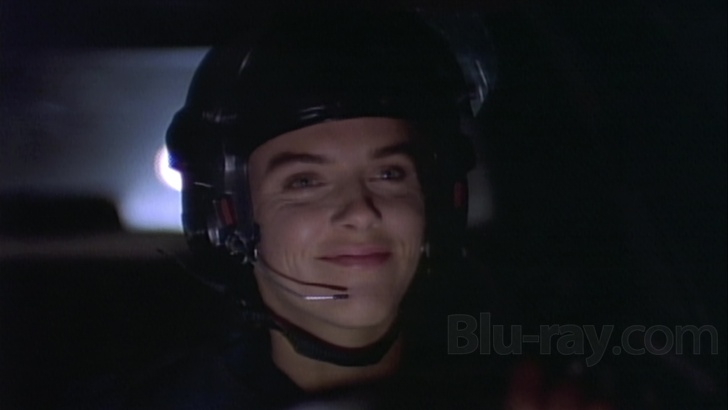
Liberation Hall has released RoboCop: The Series (1994) in a clear case that comes with a slipcover. In lieu of a leaflet, the label has instead printed an episode guide on an inner print that contains a full synopsis for each one. The series premiere and 21 episodes are distributed across five BD-50 discs. They are presented in the aspect ratio of 1.77:1, which crops and horizontally stretches the filmed 1.33:1 ratio. I have included a graphical comparison between the pilot as seen on LH versus the German-based VZ Handels GmbH transfer. As you can see, LH has cropped the image not only on the top and bottom, but also on the sides. Liberation Hall has stated that it would be too expensive to restore the picture using a new DI. It needs to be pointed out that the series was shot on celluloid and not on videotape. Van Hise quotes line producer Robert Wertheimer in his book: "The series is shot on 35mm film and conformed to tape. The production utilizes blue screen and special effects, matte paintings, traditional and computer animation" (p. 88). While the prints used for the German transfer (which differ from Liberation Hall's) could use a full-blown restoration, they're more film-like than LH, which look like analog tape. Each transfer has different color schemes. Although colors are washed out on the German, I still prefer it over LH. The latter's image boasts shimmering, chroma noise, and moiré effects.
Screenshots 1-5, 7, 9, 11, 13, 15-40 = 2022 Liberation Hall five BD-50 discs
Screenshots 6, 8, 10, 12 & 14 = 2019 VZ Handels GmbH BD-50 (second reissue of 2011 Intergroove Blu-ray)
RoboCop: The Series Blu-ray Movie, Audio Quality 
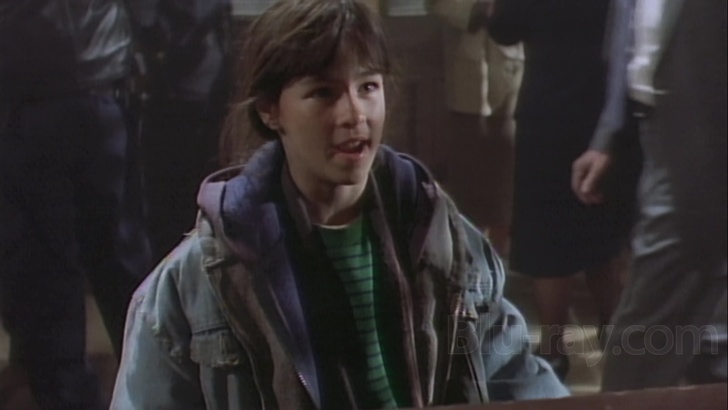
Liberation Hall includes an English LPCM 2.0 Stereo mix (1536 kbps, 16-bit) as the sole audio track. While encoded in lossless, it sounds more like a remastered lossy mix on a DVD. Dialogue, music, and f/x are primarily front heavy throughout the episodes. There is no audible tracking noise or digital tape dropouts. Spoken words are usually always intelligible but there are no subtitling options! John Stroll and Kevin Gillis do a fine job of scoring episodes as well as adapting Basil Poledouris's RoboCop theme. Unfortunately, only one cue from their score is included on Pyramid Records' soundtrack album (the rest of the tracks are ballads). Joe Walsh and Lita Ford's "Future to This Life" is a decent country song that accompanies the end titles during the season's second half.
RoboCop: The Series Blu-ray Movie, Special Features and Extras 
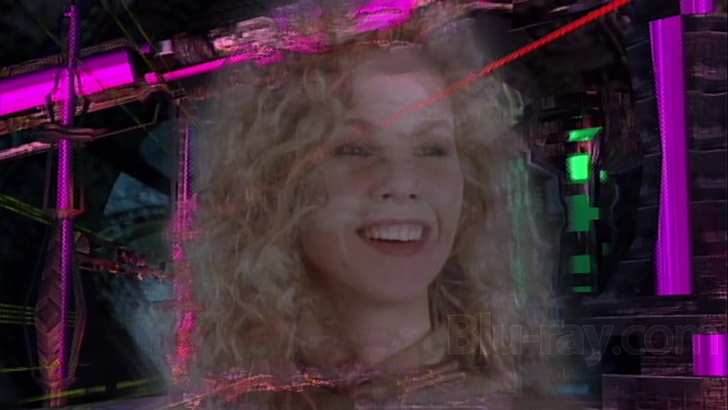
Much of the material Van Hise cites in his book chapter on RoboCop: The Series is derived from the original press kit and production notes. Liberation Hall has reproduced a lot of this same information on static text screens with a small "RoboVision font" that's kind of difficult to read. (Van Hise's chapter has more direct quotes from the actors and crew members.) The original promotional featurette and toy advert are the only live-action extras.
- Behind-the-Scenes Featurette (5:44, 480i) - this EPK piece is touted as a "sneak preview" for RoboCop: The Television Series. B-roll footage is intermixed with interview snippets that feature director Paul Lynch; executive producers Brian K. Ross, Kevin Gillis, and Stephen Downing; producer Miles Dale; second unit director T.J. Scott; as well as actors Richard Eden, Yvette Nipar, and James Kidnie. In English, not subtitled.
- Toy Commercial (0:21, upconverted to 1080p) - a TV ad promoting the toy line that was produced for the series. Featured are action figures for RoboCop and Pudface Morgan and Robo's DPD vehicle.
- Photo Gallery - a slide show comprising seventy-six color images (horizontal and vertical) that consist of publicity snapshots and on-set photographs from the series.
- Cast Profiles (seven text screens total) - bios for actors Richard Eden (two text screens), Lisa Madigan (one text screen), Blu Mankuma (one text screen), Andrea Roth (one text screen), Sarah Campbell (one text screen; a profile picture of actor Peter Costigan is erroneously displayed alongside the text), and David Gardner (one text screen).
- From Cinema to the Small Screen (six text screens)
- The Future of Law Enforcement: The History of RoboCop (six text screens)
- Fun Facts & Info (three text screens)
- Put Down Your Weapon: The Auto 9 Gun (two text screens)
- The Car (one text screen)
- The Suit (two text screens)
RoboCop: The Series Blu-ray Movie, Overall Score and Recommendation 
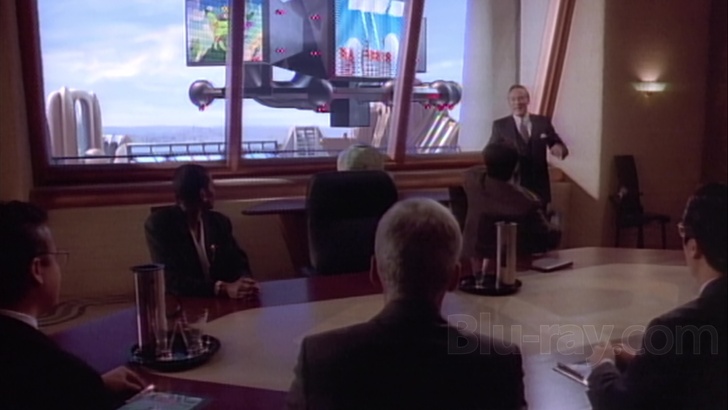
I have fonder memories of RoboCop: The Series, which I remember being better when I watched in 1994 than I do revisiting it in this set from Liberation Hall. It can't hold a candle to either RoboCop (1987) or RoboCop 2. The difference in quality between the two films and the series isn't even close. The episodes do improve after the turgid pilot but overall, they're mediocre. I like that LH has included some of the original press material but alas, there are no new bonus materials. I would seek out German's VZ Handels GmbH Blu-ray, which presents the episodes in 1:33:1 at a resolution of 576i. The authoring and compression don't matter on the LH because the episodes have all been upscaled from 480i/p to 1080p without proper remastering. While LH's DVD set presents the episodes in 1.33:1, they've been significantly cropped here to fill a 16:9 screen. A purchase should only be a consideration for RoboCop completists and those who enjoy the series.
Similar titles
Similar titles you might also like

Turbo Kid
Ultra Turbo-Charged Collector's Edition
2015

Spacehunter: Adventures in the Forbidden Zone
1983

Damnation Alley
1977

Starship Troopers 2: Hero of the Federation
2004

Dollman
1991

Death Race 2000
Roger Corman's Cult Classics
1975

Trancers 5: Sudden Deth
1994

RoboCop 4K
2014

Metalstorm: The Destruction of Jared-Syn 3D
1983

Enemy Mine
Limited Edition to 3000 - SOLD OUT
1985

Trancers 4: Jack of Swords
Remastered
1994

When Dinosaurs Ruled the Earth
Warner Archive Collection
1970

The Phantom Planet
1961

Battle for the Lost Planet
Galaxy
1986

Top Line
Alien Terminator | Standard Edition
1988

Arena
1989

Wheels of Fire
Roger Corman's Post Nuke Collection
1985

Megaforce
1982

The Sisterhood
Roger Corman's Post Nuke Collection
1988

Equalizer 2000
Roger Corman's Post Nuke Collection
1987
